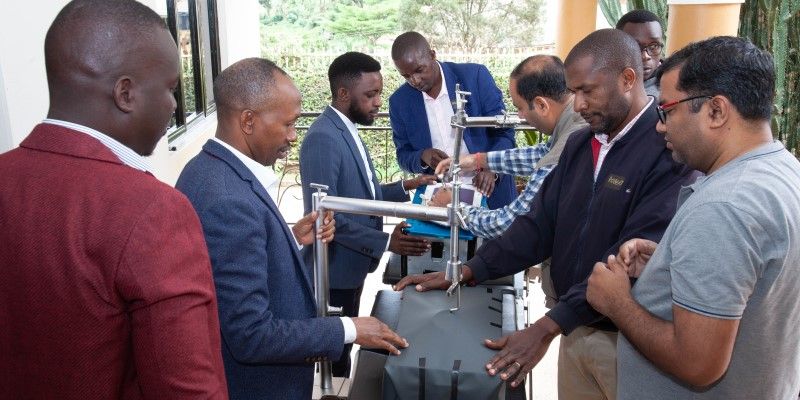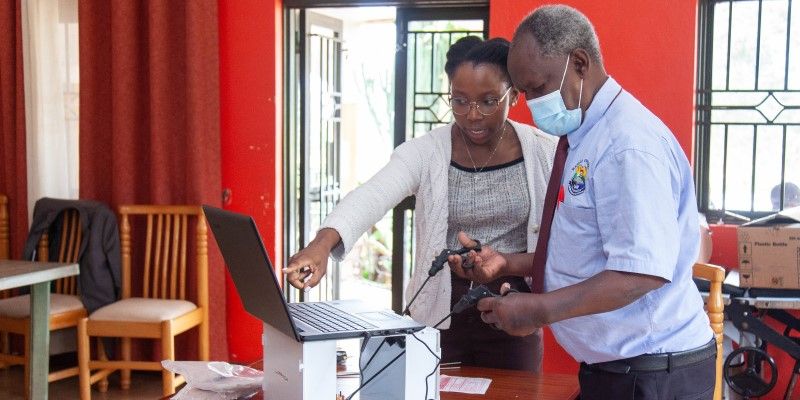Operations that we take for granted in the UK, such as keyhole surgery to remove a gall bladder or appendix, are not available to nine out of ten people worldwide, mostly in low and middle-income countries. Inequality of access to healthcare is a reality in every country in the world, but in places like India or sub-Saharan Africa, the differences are very stark.
In big cities like Delhi or Kampala, some private hospitals provide healthcare that is equal to the care found in richer countries like the UK. But in remote, rural areas, surgery is either non-existent or available to only a few.
A team of surgeons, engineers and designers from India, Africa and the University of Leeds have designed a technology to make it easier to carry out abdominal keyhole surgery in remote and low resource locations. They are now helping to train surgeons in India and countries in sub-Saharan Africa to use it.
The benefits of keyhole surgery
Abdominal keyhole surgery – or laparoscopy to give it its official name – brings many benefits. A smaller cut means less pain, no need for general anaesthetic, less risk of infection and a quicker recovery, important factors for those on lower incomes who can’t afford time off work.
But this type of keyhole surgery can take longer, costs more and is more technically demanding than open surgery. This can make it prohibitive for healthcare facilities with fewer resources.
One of the main limiting factors for many abdominal keyhole surgeries is carbon dioxide. This gas is normally pumped into a patient’s abdomen, to create the physical space for the surgeon to do their work. In rural and remote areas, the gas either simply isn’t available or the supply is unreliable, which could put a patient at risk mid-operation.
When a patient’s abdomen is inflated with pressurised carbon dioxide, they require a general anaesthetic and intensive monitoring during the operation by a skilled anaesthetist, which adds a further barrier in low resource settings.
The new device created by the international and multidisciplinary team mechanically lifts a patient’s abdomen to carry out laparoscopy without the need for gas. This also allows operations to be conducted with a spinal anaesthetic or epidural.

Pictured: Dr Robert Mugarura, and faculty from Kabale University Hospital, undertaking training for gasless laparoscopy.
Training and mentoring
Just having a technology designed to work in remote and rural health clinics is only the start. Surgeons also need to be able to use it confidently for a range of operations.
The University of Leeds NIHR Global Health Research Group – Surgical Technologies partnered with the Association of Rural Surgeons of India, Pd-m International (a product design company) and XLO – Ortho Life Systems (the manufacturing partner in Delhi, India) to develop the device and a training programme for its use.
Anurag Mishra, a surgeon from Maulana Azad Medical College in Delhi, was part of the team involved.
“You can’t become a competent surgeon in a five-hour workshop,” he says. “It’s inevitable that you’ll continue to face challenges and problems as you put a new technique into practice. Training can’t be just a one off – it needs to include ongoing support and mentoring. We provide this through video calls and WhatsApp messaging groups, to create a network through which surgeons can share their experiences, which is critical for embedding a new approach.”
Having successfully designed the new tool – called RAIS (RetrActor for Insufflation-less Surgery) – for work in India, the team then considered whether it could also benefit other countries and regions. Funded by the University of Leeds, the team ran some pilot workshops with surgeons in Kenya and Uganda to see whether there was interest in the technology.

Pictured: Miss Johnny Odu coordinating basic surgical skills training.
Surgical needs in sub-Saharan Africa
Professor of Healthcare Technologies, Pete Culmer, from the University of Leeds School of Mechanical Engineering, has been involved in the project from the start. Both he and Anurag Mishra are founding members of a Global multi-disciplinary collaboration called "Innovation in Global surgery" which aims to solve problems of rural surgery through innovation.
Professor Culmer says: “We wanted to be sure there was a pull for the technology, not just us as a team trying to push it. There was huge enthusiasm amongst the surgeons, who saw it as a potential solution to the inequalities in sub-Saharan Africa where healthcare is even more polarised than in India. In Nairobi, for example, keyhole surgery is only available to private patients, and it’s not available at all outside the city.”
The work that was started by the University of Leeds NIHR Global Health Research Group continued with funding from the Global Challenges Research Fund. The team are now training surgeons in Uganda and Kenya in the technique, with the aim of rolling this out to other countries such as Tanzania and Ethiopia, further funding permitting.
Surgeons from India, who understand the challenges of working in remote settings, are now running the training. Part of the strength of the programme is that as each surgeon trained in the technique becomes proficient, so they go on to train others.
“We’re using the same model as we used in India, where providing the equipment and initial training is just the start,” explains Anurag Mishra. “We are creating a network of surgeons in Uganda who can share their own unique challenges. And we’re not assuming that the same systems that work in India can simply be transferred wholesale to Africa. It’s possible that things need to change, to create ways of working that are unique to a country or region.”